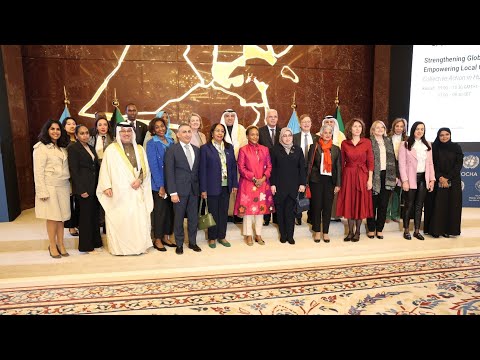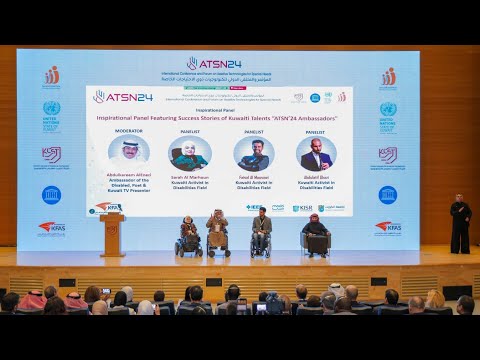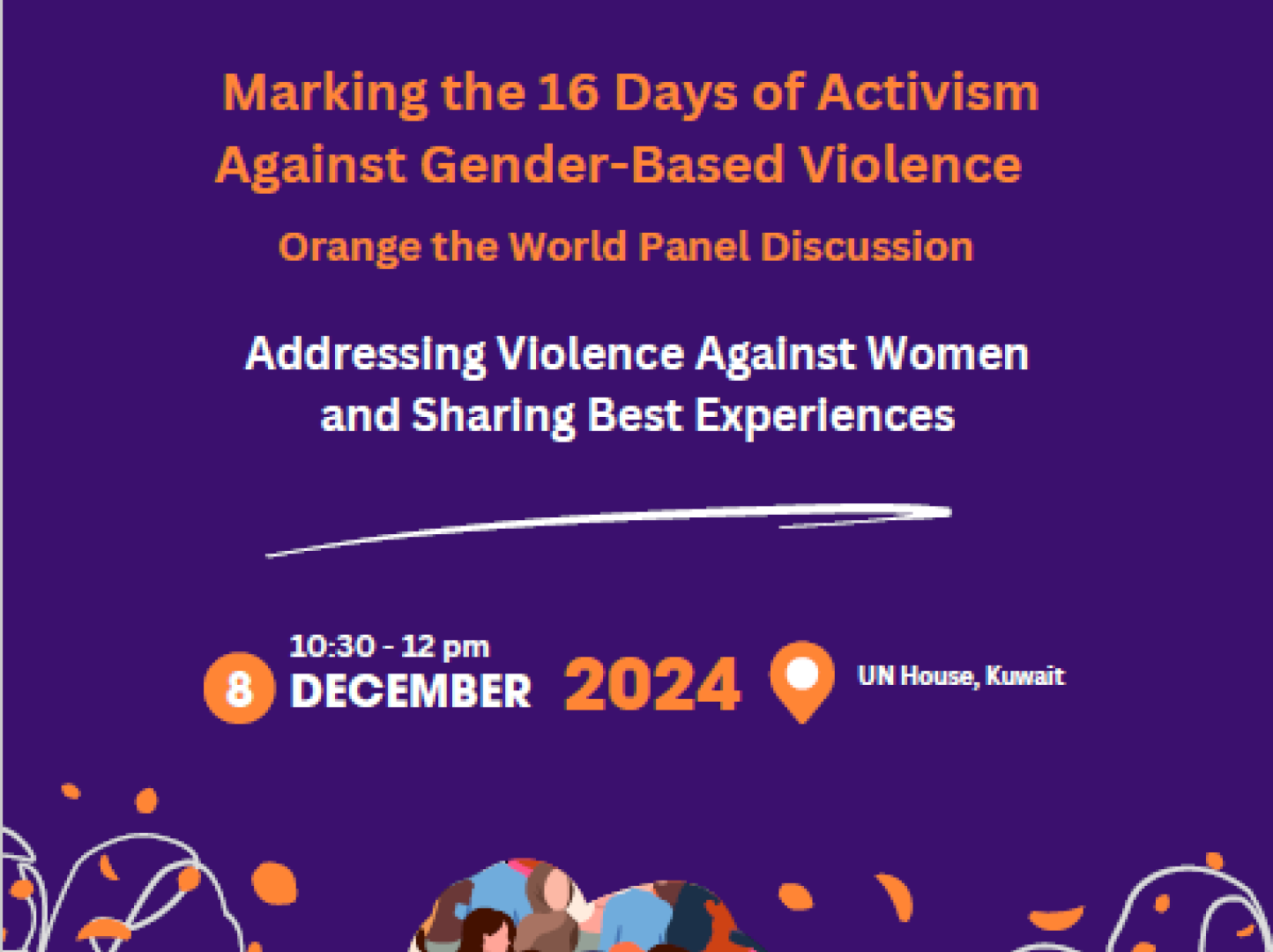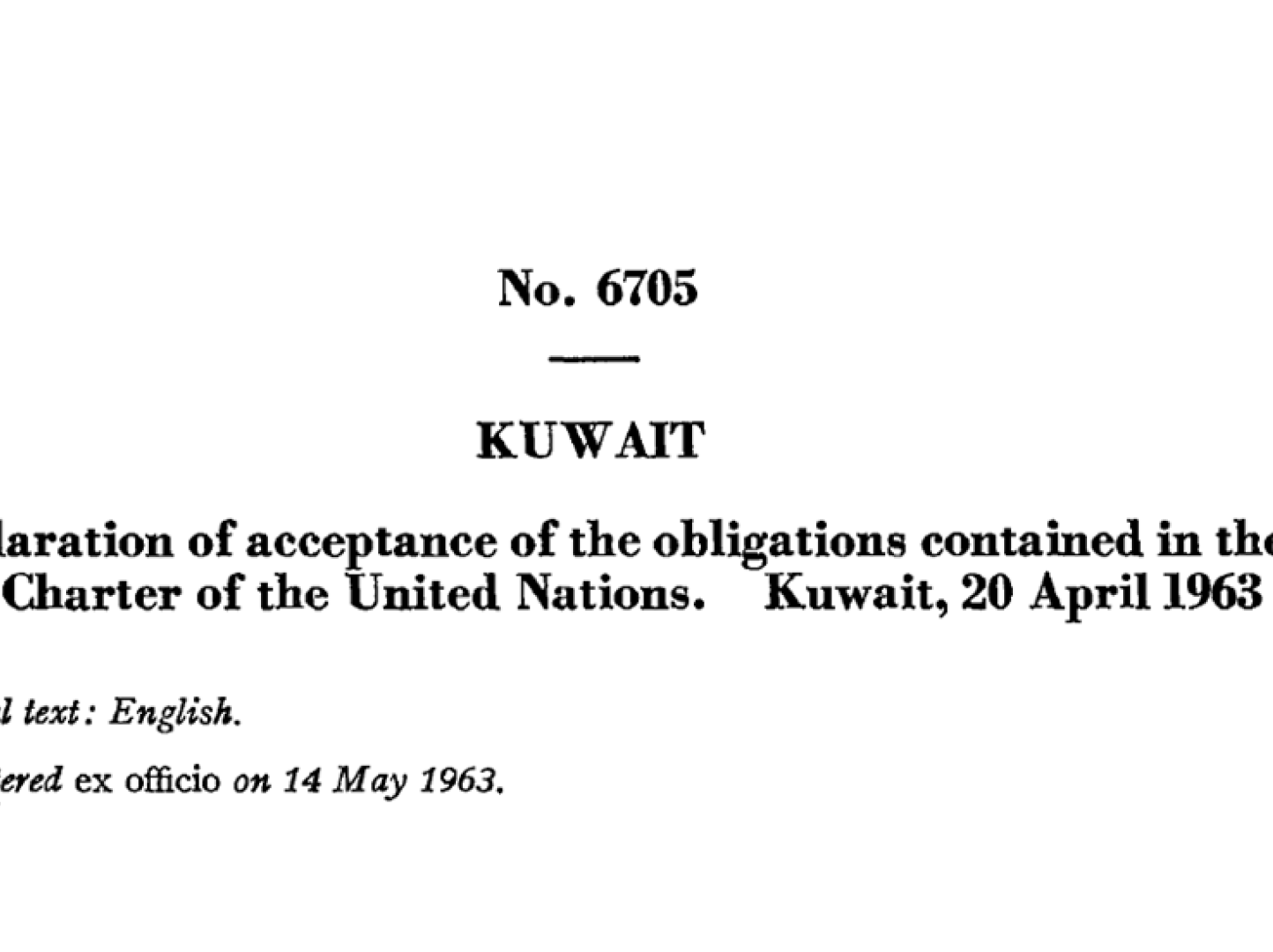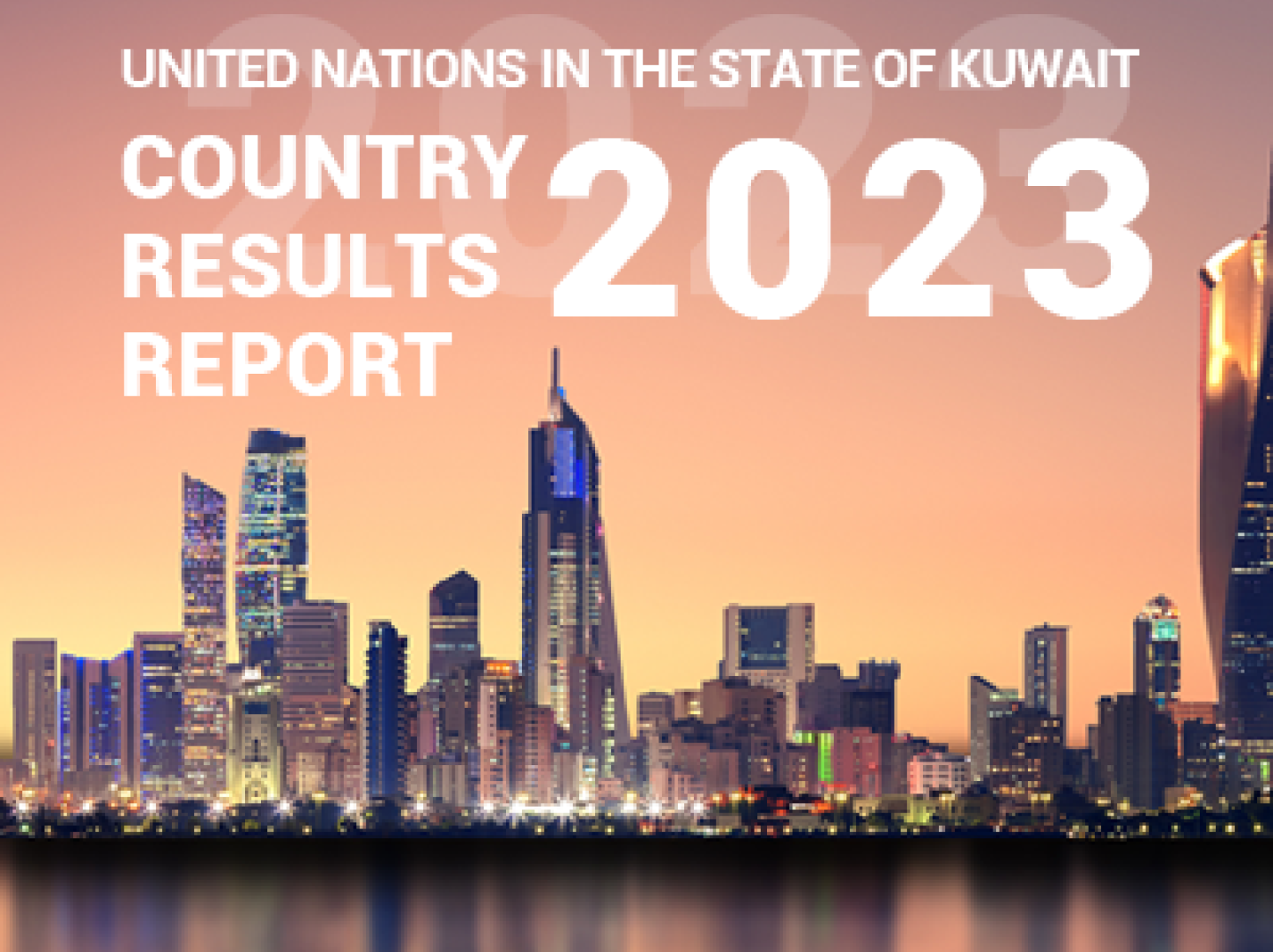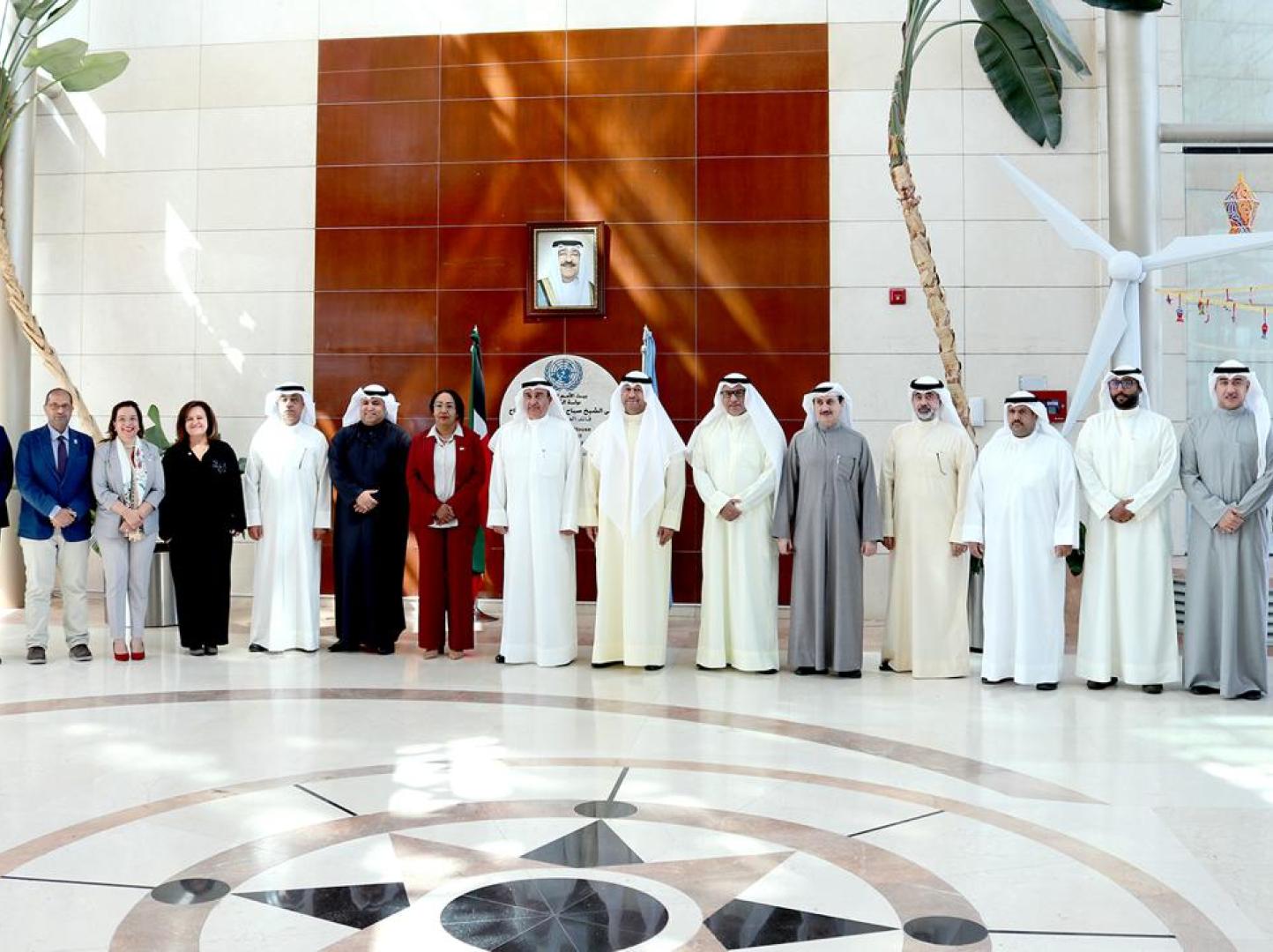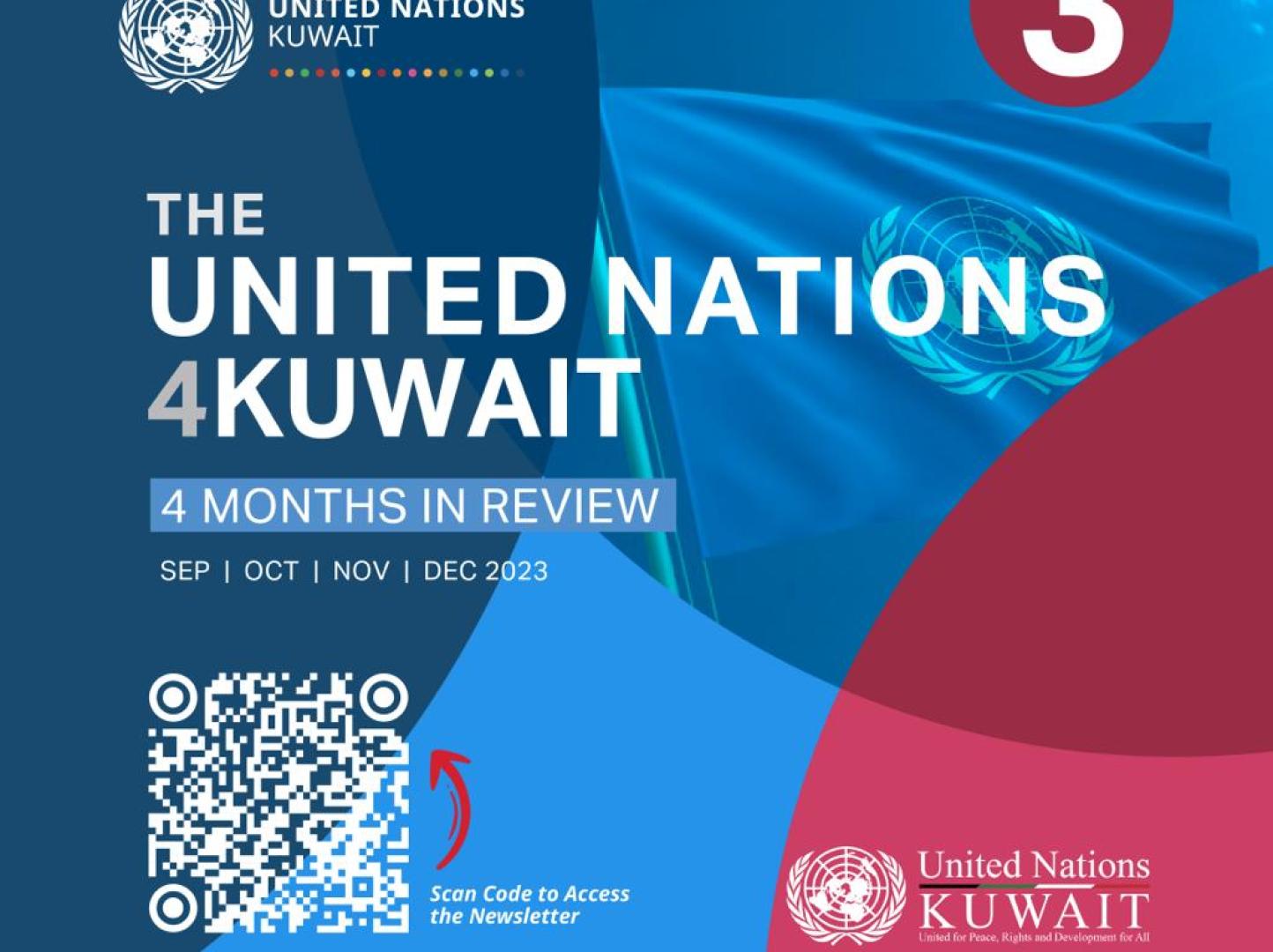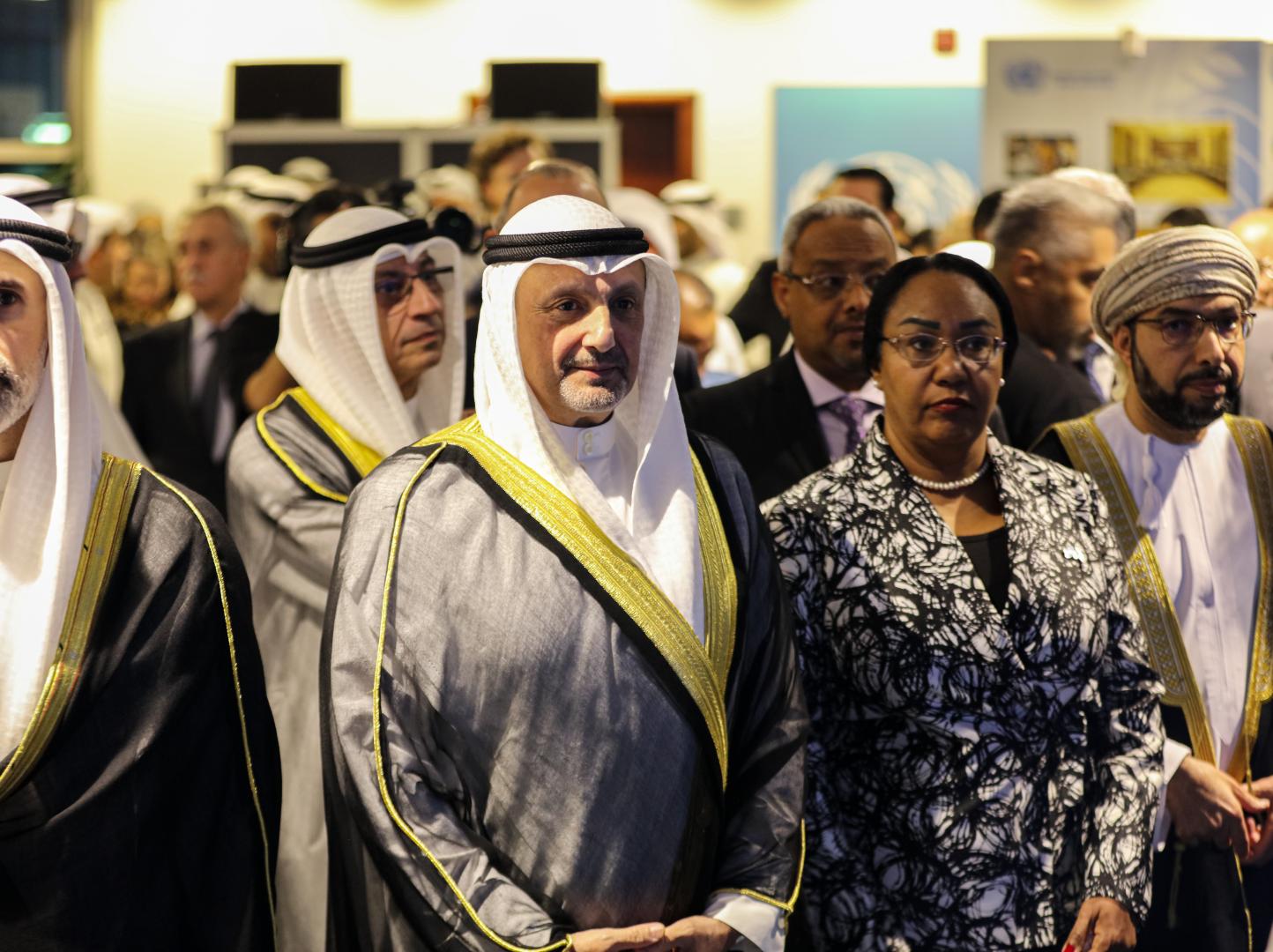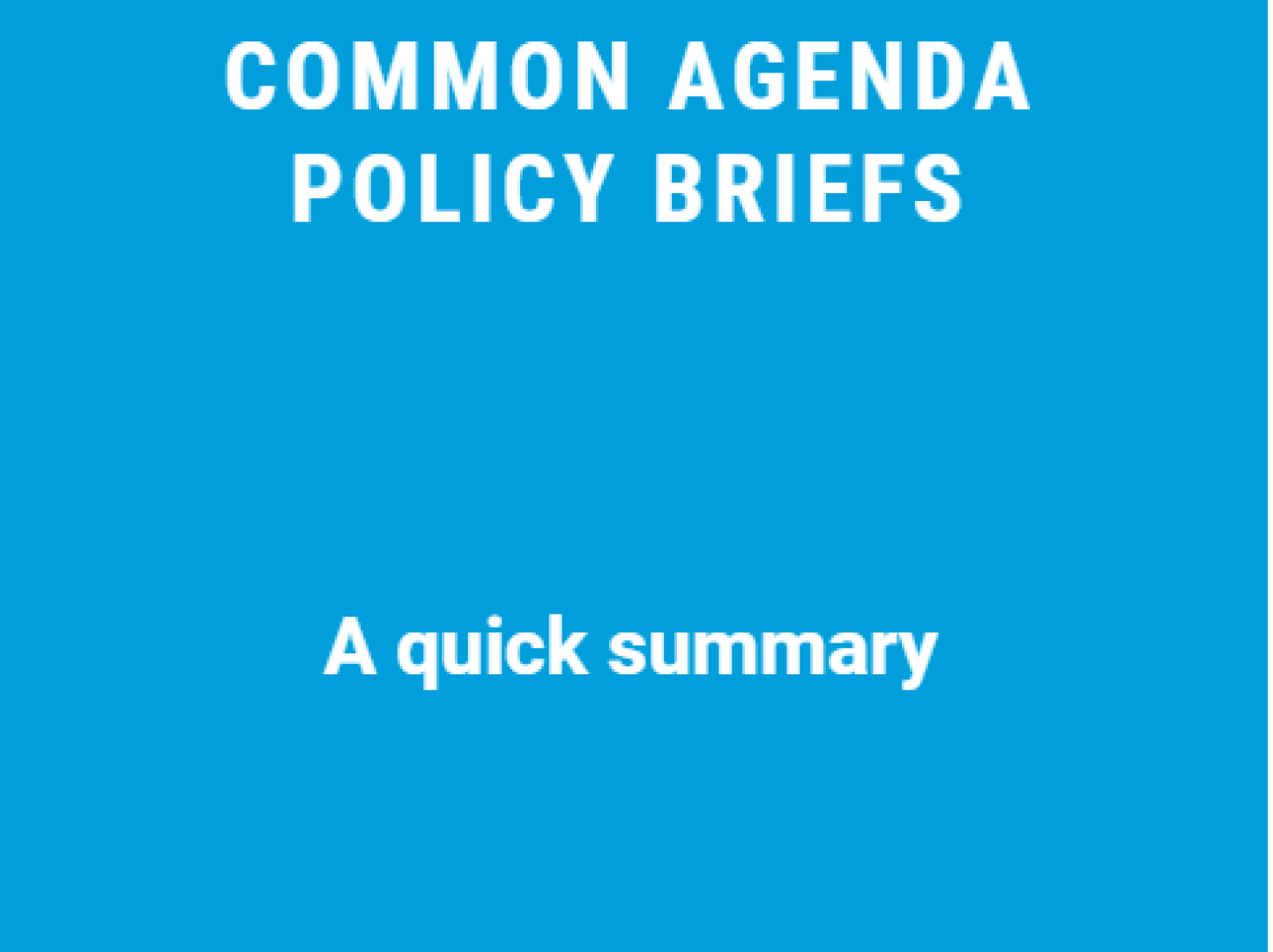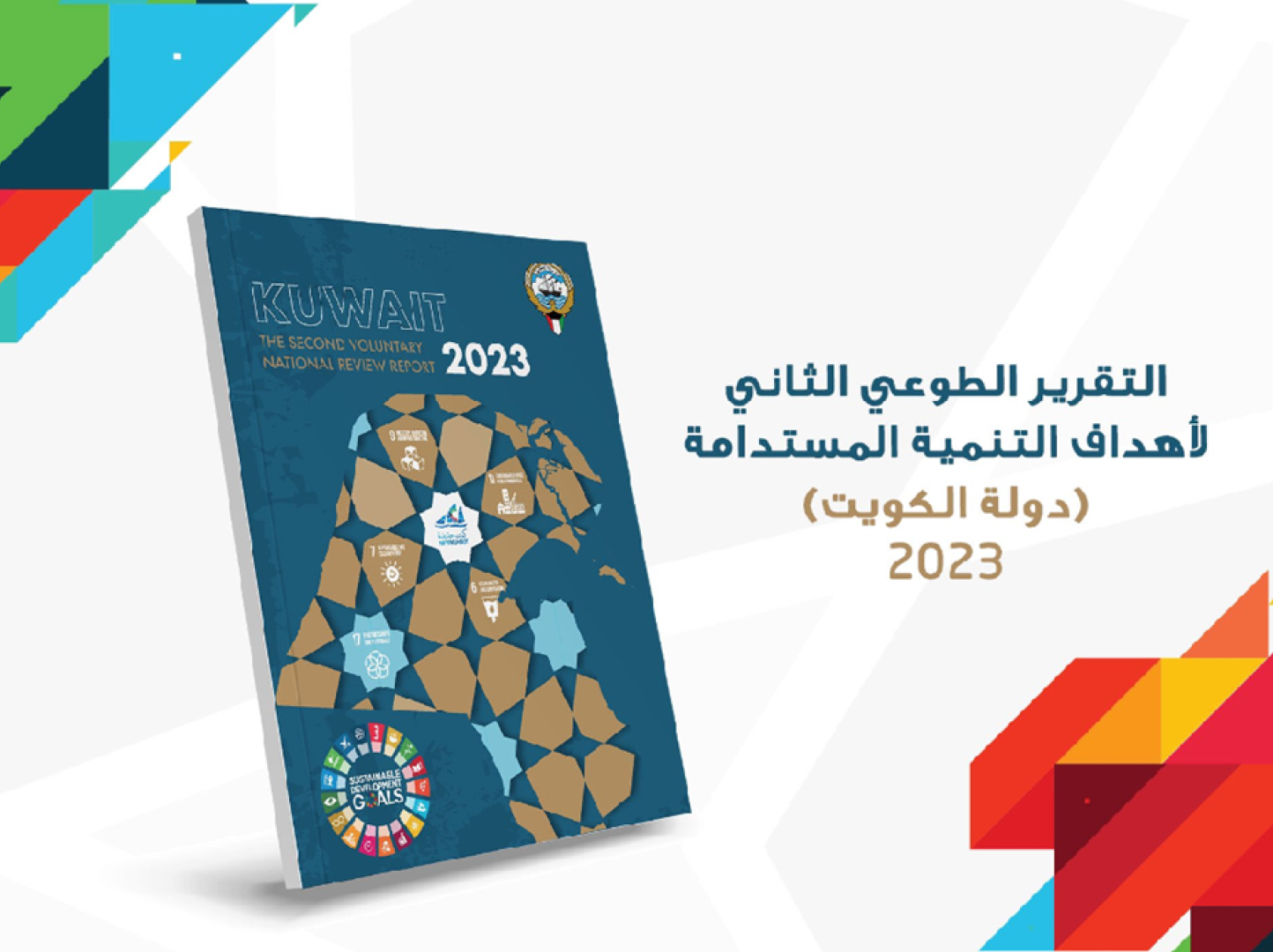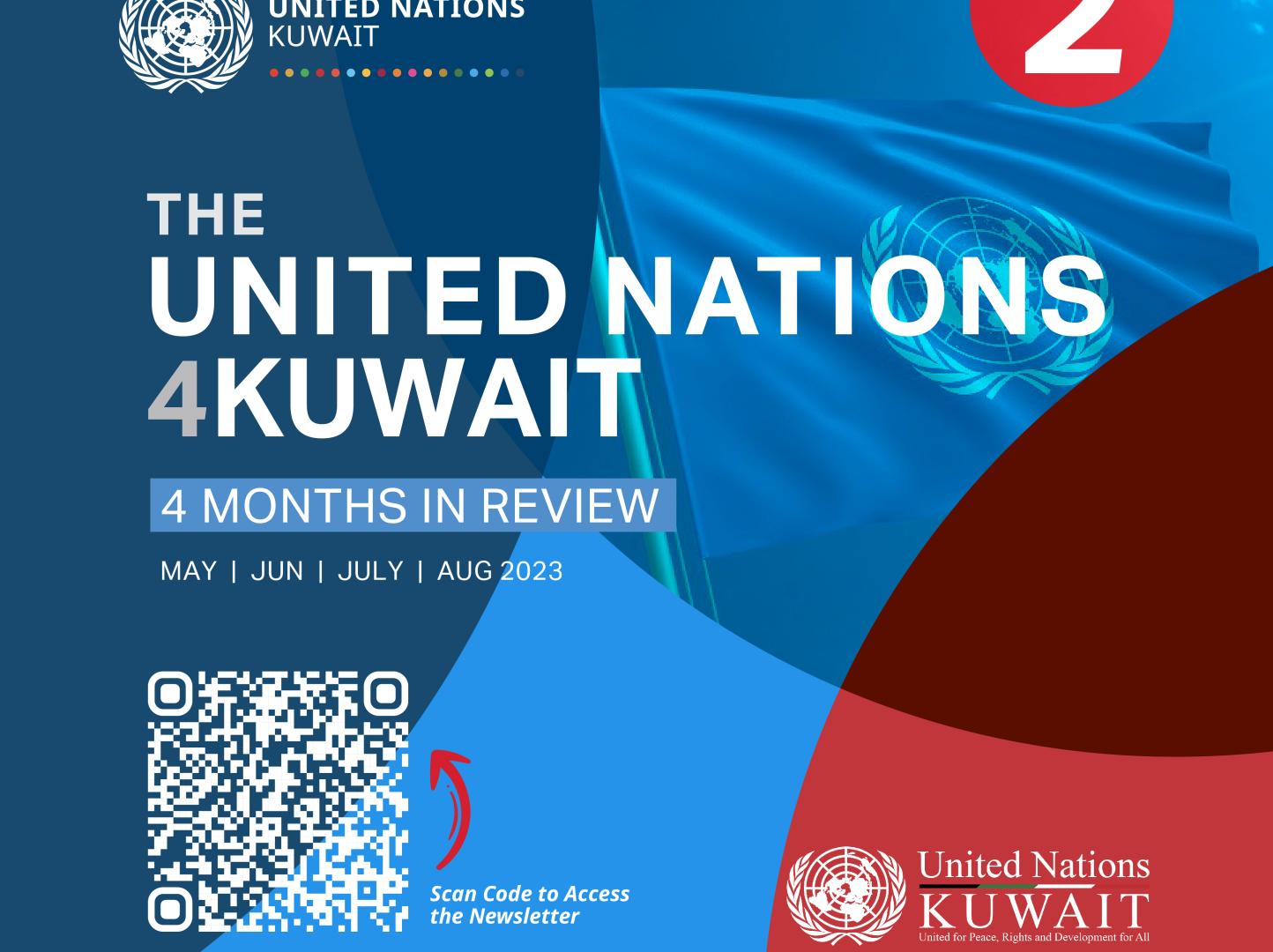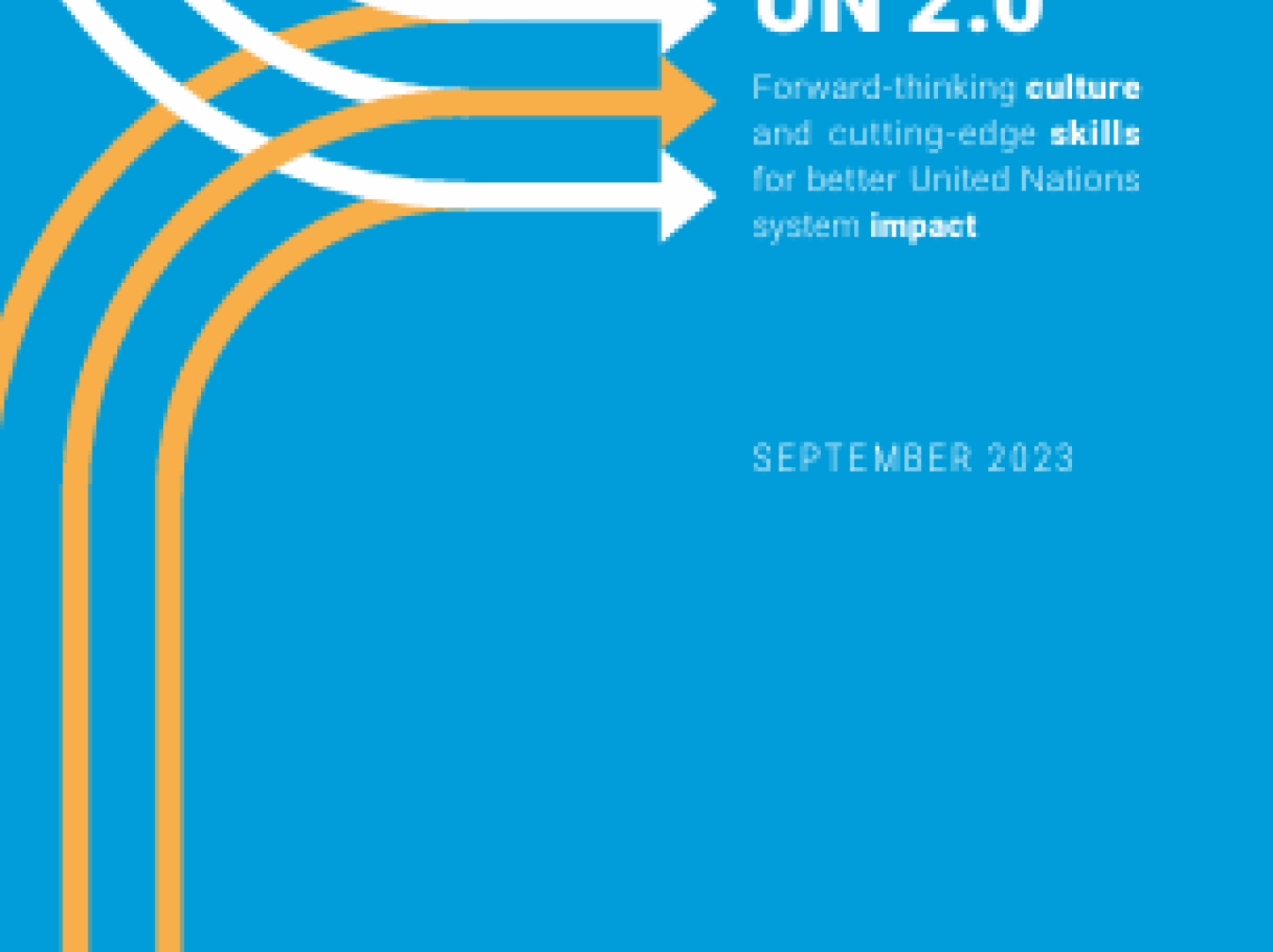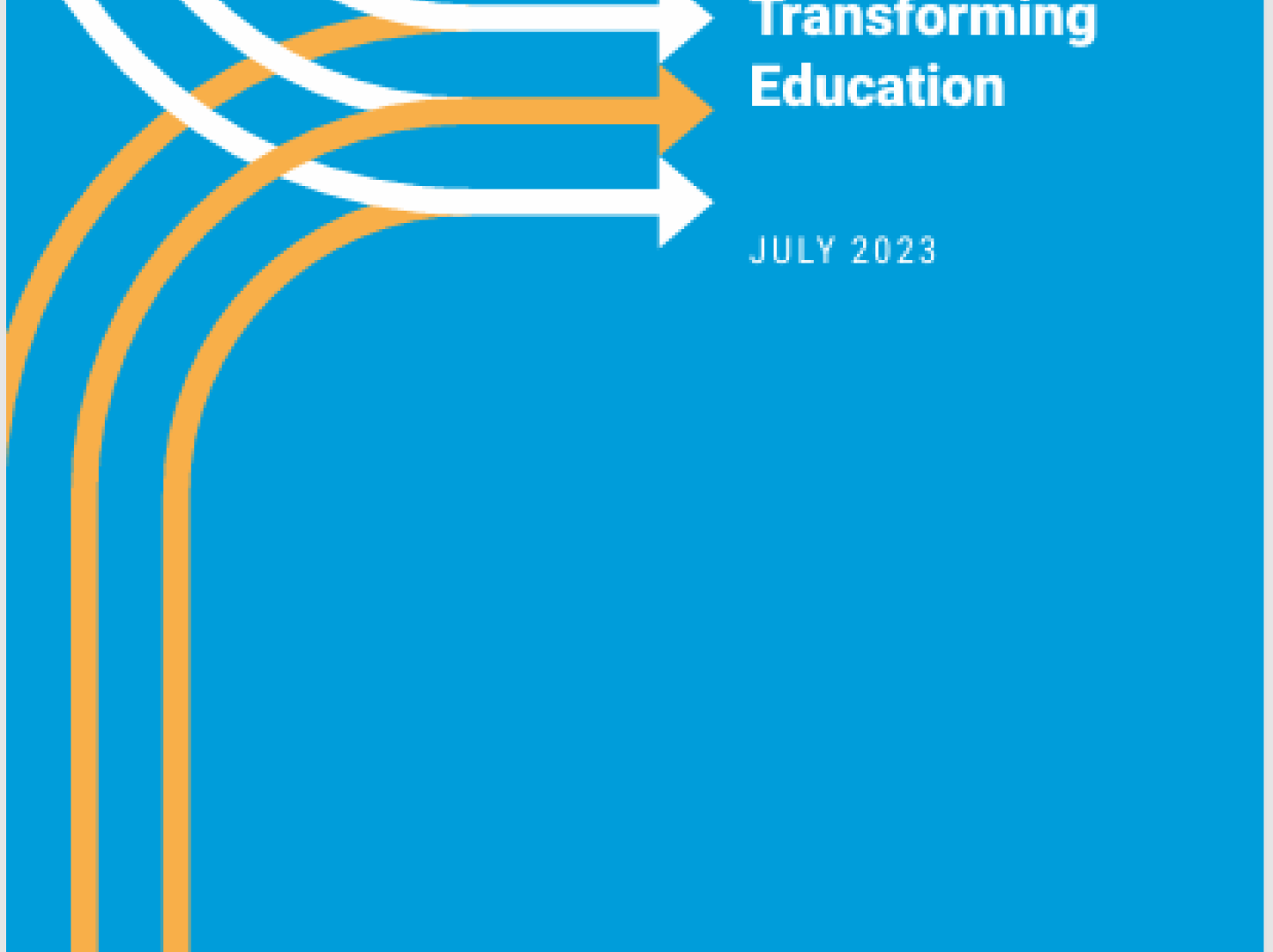Latest
Video
11 December 2024
International Volunteers Day "Voices of Service" storytelling event
Learn more
Video
09 December 2024
The International Conference and Forum on Assistive Technologies for Special Needs - International Day of Persons with Disabilities
Learn more
Video
08 December 2024
#16DaysOfActivism High-Level Panel Discussion "Orange the World"
Learn more
Latest
The Sustainable Development Goals in Kuwait
The Sustainable Development Goals are a global call to action to end poverty, protect the earth’s environment and climate, and ensure that people everywhere can enjoy peace and prosperity. These are the goals the UN is working on in Kuwait:
Video
28 November 2024
The UN in Kuwait marks the 16 Days of Activism Against Gender-Based Violence "Orange the World"
#EndViolence #OrangeTheWorld #16DaysOfActivismMarking the 16 Days of Activism Against Gender-Based Violence (GBV) Orange the World: End Violence Against Women “Strength in Unity and Diversity” The UN Resident Coordinator’s Office, in collaboration with Art and Dine, hosted a wonderful painting experience for the United Nations Staff in Kuwait and partners to mark the International Day for the Elimination of Violence Against Women. As part of the "Orange the World" campaign, we came together in vibrant orange attire to stand united against gender-based violence.Through creativity and reflection, we amplified the message of the 16 Days of Activism against Gender Based Violence 🧡 The day concluded with the symbolic release of orange balloons, spreading hope and awareness for a brighter, safer future for all 🌍✨ 🎈 Stay tuned for more #OrangeTheWorld #EndViolence #16DaysOfActivism #UNKuwait The 16 Days of Activism Against Gender-Based Violence (GBV) is a global campaign that aims to challenge violence against women and girls worldwide. Originating from the first Women’s Global Leadership Institute coordinated by the Center for Women’s Global Leadership in 1991, the campaign runs annually from November 25 (International Day for the Elimination of Violence against Women) to December 10 (Human Rights Day). This year, Kuwait joins the global community in advocating for an end to violence against women and girls through a comprehensive series of joint activities led by the UN Resident Coordinator’s Office in collaboration with key local and international partners. This year, as the world approaches the 30th anniversary of the Beijing Declaration and Platform for Action, the UNiTE campaign calls for increased accountability, stronger national strategies, and enhanced support for women’s rights organizations. Under the theme “Towards 30 years of the Beijing Declaration and Platform for Action: UNiTE to End Violence Against Women,” the campaign calls on governments, civil society, the private sector, and all UN partners to strengthen their commitment and accelerate progress toward eliminating violence against women and girls.
1 of 5
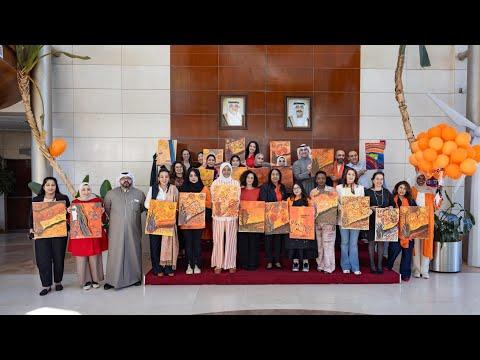
Video
09 December 2024
The International Conference and Forum on Assistive Technologies for Special Needs - International Day of Persons with Disabilities
ATSN’24: A Groundbreaking Event on Assistive Technology!This week Kuwait hosted the "International Conference and Forum on Assistive Technologies for Special Needs" (ATSN’24) at @kcstkwt uniting experts, innovators, and advocates to showcase cutting-edge solutions that empower individuals with disabilities.We gathered to celebrate the resilience and potential of over 1 billion people globally living with disabilities.
Together with @KCSTkwt @MOSA1.kw and @UNESCO_gccyemen, sponsored by @KFASinfo, we highlight the transformative role of technology in bridging and inclusivity, empowering individuals with tools like AI-powered prosthetics, autonomous vehicles, and robotic assistance. Let’s work together for a world where innovation enables everyone to thrive.
🔹 AI-driven assistive technologies
🔹 Innovations in robotics for mobility and therapy
🔹 Ethical and cybersecurity considerations
🔹 Success stories of inclusion and empowerment
As we shape a community of inclusivity and innovation together!
Stay tuned for more updates!
#ATSN2024Q8 #TechForInclusion #InnovationForAll #KuwaitForInclusion #AssistiveTechnology #GlobalCollaboration
#PWDQ8
Together with @KCSTkwt @MOSA1.kw and @UNESCO_gccyemen, sponsored by @KFASinfo, we highlight the transformative role of technology in bridging and inclusivity, empowering individuals with tools like AI-powered prosthetics, autonomous vehicles, and robotic assistance. Let’s work together for a world where innovation enables everyone to thrive.
🔹 AI-driven assistive technologies
🔹 Innovations in robotics for mobility and therapy
🔹 Ethical and cybersecurity considerations
🔹 Success stories of inclusion and empowerment
As we shape a community of inclusivity and innovation together!
Stay tuned for more updates!
#ATSN2024Q8 #TechForInclusion #InnovationForAll #KuwaitForInclusion #AssistiveTechnology #GlobalCollaboration
#PWDQ8
1 of 5
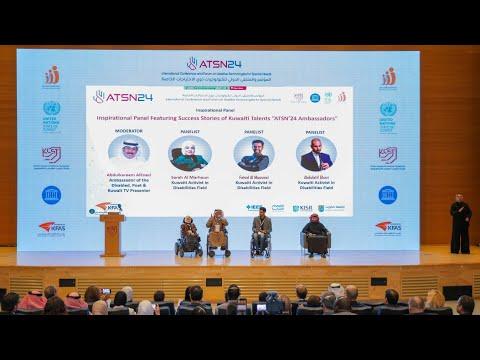
Video
04 March 2024
HH the Amir Sheikh Mishal Al-Ahmad Al-Jaber Al-Sabah and Kuwait Leadership receive UN DSG
HH the Amir Sheikh Mishal Al-Ahmad Al-Jaber Al-Sabah and Kuwait Leadership receive UN Deputy Secretary General
1 of 5
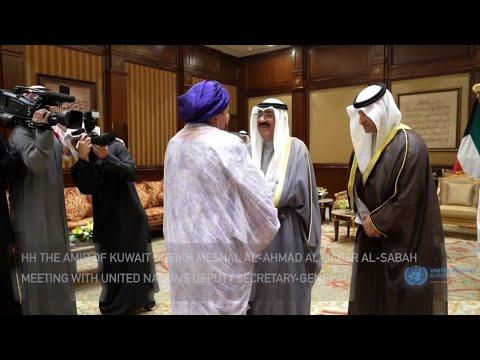
Video
04 December 2024
The Global Humanitarian Overview 2025 Launch from Kuwait: The UN and humanitarian partners launch $47 billion appeal for 2025 to support 190 million people worldwide
Humanitarian diplomacy more critical than ever today to protect and serve people in need” United Nations and humanitarian partners launch $47 billion appeal for 2025 to support 190 million people worldwide (Kuwait, 4 December 2024) An estimated 305 million people around the world will require humanitarian assistance in the coming year, the United Nations Office for the Coordination of Humanitarian Affairs (OCHA) said today, launching the Global Humanitarian Overview (GHO) for 2025. The appeal launched simultaneously in three locations – Kuwait City, Geneva and Nairobi – seeks $47 billion to provide life-saving aid in 32 countries and nine refugee-hosting regions. The event in Kuwait focused on strengthening diplomatic engagement to enhance responses to humanitarian crises. “The Global Humanitarian Overview for 2025 shows the scale of the challenges and suffering facing the international community,” said His Excellency Sheikh Jarrah Jaber Al-Ahmad Al-Sabah, Deputy Minister of Foreign Affairs of the State of Kuwait. He added, “At the same time, it is an opportunity to advance international humanitarian action by strengthening cooperation between all parties involved in these noble efforts, including donor and recipient member states, and international and regional humanitarian organizations, to bring about real change on the ground and improve the mechanisms in place to deliver humanitarian and relief assistance to those in need.” Joyce Msuya, the Assistant-Secretary-General and Deputy Emergency Relief Coordinator said, “The world is gripped by one of the worst humanitarian crises of the modern era.” She added, “Humanitarian diplomacy has never been more critical. It mobilizes resources, amplifies the voices of the most vulnerable, and fosters dialogue to ensure aid reaches those in their darkest hour.”Armed conflicts are intensifying in frequency and brutality, forcing nearly 123 million people to flee their homes. Climate-induced disasters are ravaging communities, devastating food systems and driving mass displacement. Meanwhile, older crises remain unresolved, with the average humanitarian appeal now spanning a decade.
1 of 5
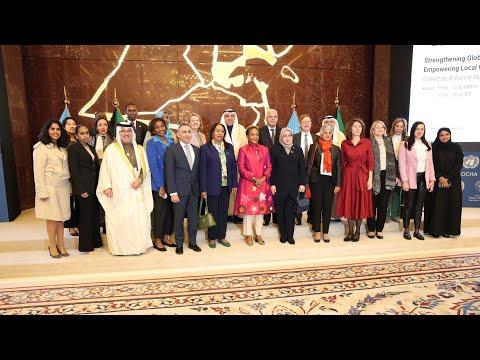
Video
08 December 2024
#16DaysOfActivism High-Level Panel Discussion "Orange the World"
From November 25 to December 10, the United Nations in the State of Kuwait actively participated in raising awareness on the 16 Days of Activism Against Gender-Based Violence (GBV) global campaign, reaffirming its commitment to advancing women’s rights and eliminating violence against women and girls.
This year’s activities, organized by the UN Resident Coordinator Office in coordination with United Nations Agencies and in collaboration with the Government of Kuwait and international partners, centered on the theme: “Towards 30 Years of the Beijing Declaration and Platform for Action: UNiTE to End Violence Against Women.
📍 The campaign featured a high-level panel discussion today in collaboration with including key note speeches from:
- H.E. Ms. Ghada Eltahir, UN Resident Coordinator in the State of Kuwait
- H.E. Ambassador Sheikha Jawaher Al Sabah, Assistant Foreign Minister for Human Rights Affairs
- H.E. Mr. Olivier Gauvin, Ambassador of France to Kuwait
- Ms. Marie Guillaume
And a great opportunity to hear panellists from different backgrounds and technical expertise:
- Prof. Lubna Al Kazi, Professor at Kuwait University, founder of @wrsc_kw_kuwait
- Mr. Mazen AboulHosn, @@iomkuwait Chief of Mission
- Ms.Marie Guillaume, Director of AVAD Republic of France.
Key outcomes of the panel discussion included:
✅ Enhanced awareness of strategies to address GBV, focusing on vulnerable groups.
✅ Strengthened collaboration between government, civil society, and international organizations.
✅ Promotion of best practices for holistic victim support and GBV prevention frameworks.
A special thanks to @unwomenarabic for their participation and reflections during the event.
The event underscored the critical importance of collective action to eliminate violence against women and girls. As Kuwait aligns its efforts with global commitments, this discussion has set a foundation for more inclusive and impactful strategies moving forward.
#16DaysOfActivism #EndGBV #UNiTE #BeijingDeclaration #16DaysOfActivismAgainstGBV
This year’s activities, organized by the UN Resident Coordinator Office in coordination with United Nations Agencies and in collaboration with the Government of Kuwait and international partners, centered on the theme: “Towards 30 Years of the Beijing Declaration and Platform for Action: UNiTE to End Violence Against Women.
📍 The campaign featured a high-level panel discussion today in collaboration with including key note speeches from:
- H.E. Ms. Ghada Eltahir, UN Resident Coordinator in the State of Kuwait
- H.E. Ambassador Sheikha Jawaher Al Sabah, Assistant Foreign Minister for Human Rights Affairs
- H.E. Mr. Olivier Gauvin, Ambassador of France to Kuwait
- Ms. Marie Guillaume
And a great opportunity to hear panellists from different backgrounds and technical expertise:
- Prof. Lubna Al Kazi, Professor at Kuwait University, founder of @wrsc_kw_kuwait
- Mr. Mazen AboulHosn, @@iomkuwait Chief of Mission
- Ms.Marie Guillaume, Director of AVAD Republic of France.
Key outcomes of the panel discussion included:
✅ Enhanced awareness of strategies to address GBV, focusing on vulnerable groups.
✅ Strengthened collaboration between government, civil society, and international organizations.
✅ Promotion of best practices for holistic victim support and GBV prevention frameworks.
A special thanks to @unwomenarabic for their participation and reflections during the event.
The event underscored the critical importance of collective action to eliminate violence against women and girls. As Kuwait aligns its efforts with global commitments, this discussion has set a foundation for more inclusive and impactful strategies moving forward.
#16DaysOfActivism #EndGBV #UNiTE #BeijingDeclaration #16DaysOfActivismAgainstGBV
1 of 5
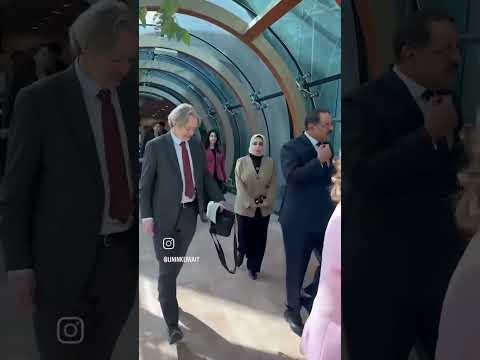
Story
24 October 2024
Young Ambassador Programme Season 3 : Sustainable Peace and Security
Believing that youth are the cornerstone of achieving SDGs, the RCO in Kuwait launched the Young Ambassador initiative to empower the next generation of leaders. The initiative is at its third edition and each edition covered a key topic in the 2030 Agenda for Sustainable Development and the SG priorities: gender equality in the first edition, climate action in the second, and peace and security in the third, that was launched on International Peace Day. The RCO plays a central role in coordinating the program, ensuring young participants gain hands-on experience in diplomacy, leadership, and advocacy. Supported by the UK and Canadian embassies and under the patronage of the Kuwaiti Ministry of Foreign Affairs, Young Ambassadors equips youth with the skills to contribute to SDG-focused international collaboration. During the upcoming GCC presidency of Kuwait, The RCO is looking forward to exploring possibilities to roll out the programme in other countries of the region and beyond, to expand this programme and empower youth everywhere.
1 of 5
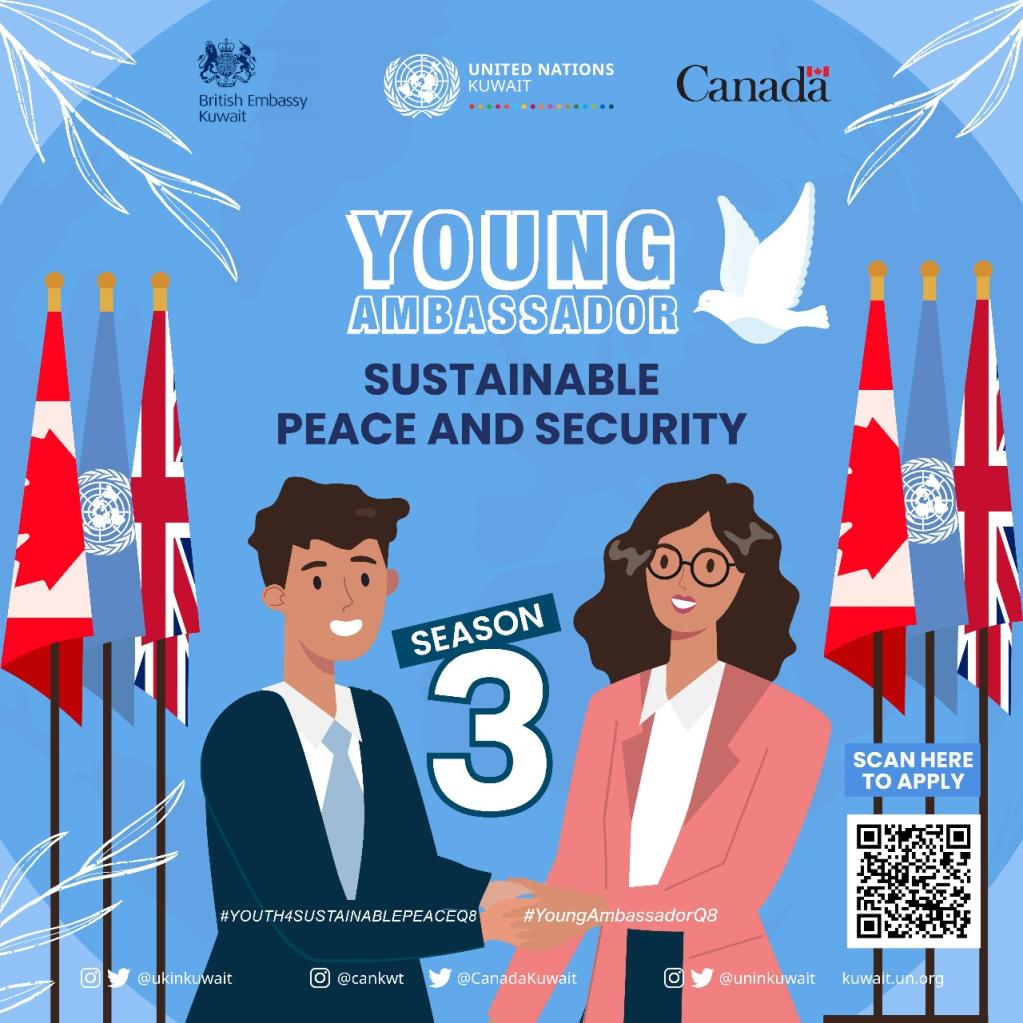
Story
04 February 2024
The Kuwaiti Women Cultural Social Society Welcome UN Resident Coordinator Mrs. Ghada Eltahir
The President and Members of the Board of Directors of the Kuwaiti Women Cultural Social Society welcomed UN Resident Coordinator Mrs. Ghada Eltahir on Thursday, February 1, 2024. The meeting was attended by Mrs. Lulwa Al Mulla/Chairman of the Board of Directors Mrs. Ghada Al-Ghanem/Secretary-General and member of the Board of Directors: Mrs. Mashael Al-Shuwaihan and Ms. Sharifa Thursday.
The visit aimed to learn about the association’s activities and its efforts towards women’s and community issues in the State of Kuwait and discuss ways of collaboration. UNRC was accompanied by Public Information Officer Ms. Asmae Ait ssi.
The Society's main objectives are:
1- Awareness of family, women and children issues, their duties and rights.
2- Developing and organizing training programs that contribute to empowering family members.
3- Participate in the development of education for children, especially the hearing and speech-impaired category, through the administration of Al-Bustan Nursery located in Khalidiya, Block 2, St. 28, St. 2, in accordance with the decisions and regulations in force in the State of Kuwait.
4- Suggesting visuals for the development of education and the culture of family members.
5- Providing moral and financial support to the needy groups in society, such as patients, needy families and students.
6- Establishing and operating educational and recreational clubs for children.
2- Developing and organizing training programs that contribute to empowering family members.
3- Participate in the development of education for children, especially the hearing and speech-impaired category, through the administration of Al-Bustan Nursery located in Khalidiya, Block 2, St. 28, St. 2, in accordance with the decisions and regulations in force in the State of Kuwait.
4- Suggesting visuals for the development of education and the culture of family members.
5- Providing moral and financial support to the needy groups in society, such as patients, needy families and students.
6- Establishing and operating educational and recreational clubs for children.
1 of 5
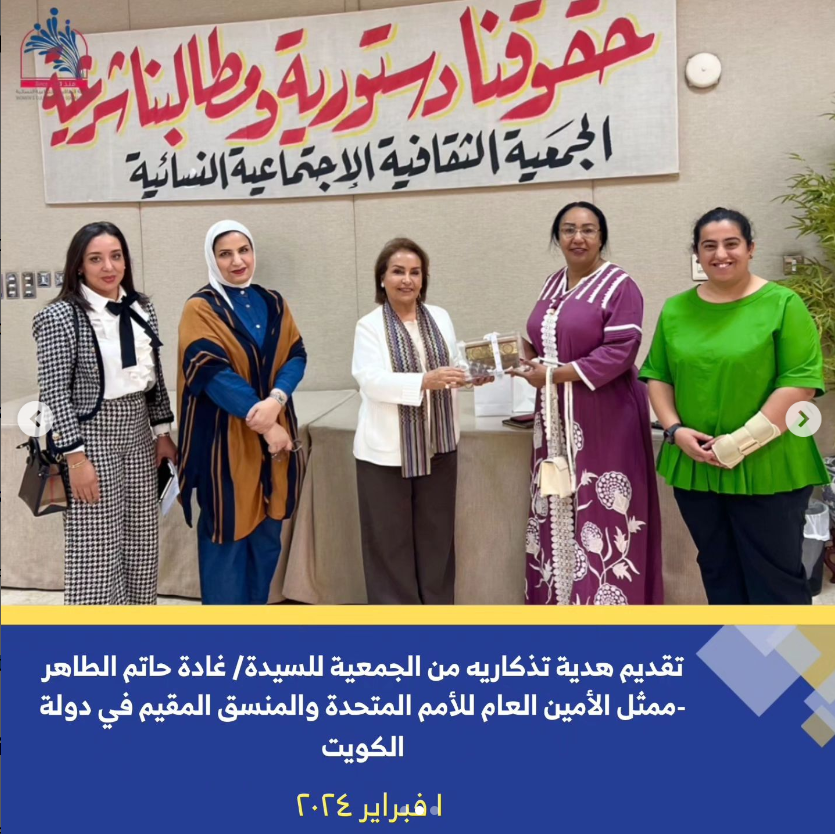
Story
29 January 2024
Workshop on the Development of National Human Rights Plans to Follow Up the Implementation of Recommendations Issued by International Human Rights Mechanisms
Speech of the Representative of the Secretary-General of the United Nations and Resident Coordinator in the State of Kuwait at the opening of a training workshop in cooperation with the Kuwait Ministry of Foreign Affairs and the Office of the United Nations High Commissioner for Human Rights on "Workshop on the Development of National Human Rights Plans to Follow Up the Implementation of Recommendations Issued by International Human Rights Mechanisms"
H.E. Sheikha Jawaher Al-Sabah, Assistant Foreign Minister for Human Rights of the State of Kuwait
Mr. Mazen Shaqoura, Regional Representative of the Office of the United Nations High Commissioner for the Middle East and North Africa
Your Excellencies Ambassadors
Colleagues, friends, ladies and gentlemen, distinguished guests, good morning,
UN Resident Coordinator Ghada Eltahir was honored to address participants to highlight the UN collaborative efforts and commitments to human rights in the State of Kuwait. "I would like to start by congratulating the State of Kuwait's for its recent membership at the United Nations Human Rights Council (UNHRC) which further exemplifies its commitment to promoting and safeguarding human rights on the global stage. Kuwait's active participation in the council provides a platform to contribute its unique perspectives, experiences, and initiatives to the international human rights discourse. This involvement signifies a willingness to not only uphold its own human rights standards but also to contribute constructively to the advancement of global norms and practices. The United Nations’s partnership with the State of Kuwait reflects a shared dedication to upholding the principles enshrined in the Universal Declaration of Human Rights. Over the years, we have witnessed Kuwait’s unwavering commitment to fostering an environment where every individual's dignity and rights are respected. Kuwait's engagement with UN mechanisms at various levels and mandated institutions, with the Esteemed Ministry of Foreign Affairs on the forefront has been instrumental in promoting human rights. Through dialogue and cooperation, we have collectively worked towards advancing social justice, promoting gender equality, and ensuring the protection of vulnerable populations. The Government of Kuwait's initiatives, such as its national action plans and legislative reforms, underscore its determination to create a society where human rights are a cornerstone. It is imperative to acknowledge Kuwait's strides in aligning its domestic policies with international human rights standards. Our collaborative efforts extend beyond rhetoric, manifesting tangible improvements in areas such as education, healthcare, People with Disabilities, Women’s rights and labor rights. This reflects not only a commitment to human rights but also a dedication to sustainable development. Kuwait has demonstrated a commendable dedication to improving its human rights record by actively engaging with OHCHR recommendations and following up on Special Procedures towards implementing international mechanisms of human rights. The ongoing dialogue between Kuwait and the UN reflects a commitment to continuous self-assessment and improvement and a willingness to address challenges, implement reforms, and align policies with international human rights standards. A significant milestone in Kuwait's commitment to human rights is the establishment of the National Diwan of Human Rights. This institution serves as a pivotal platform for fostering dialogue, engagement, and collaboration among various stakeholders, including government officials, civil society organizations, and the public. The National Diwaniya stands as a testament to Kuwait's dedication to transparency and accountability, reinforcing the commitment to creating a society where human rights are not only upheld but actively promoted at every level. The United Nations has always and continues to stand ready to provide all necessary support. As we move forward, let us reaffirm our joint commitment to strengthening the partnership between Kuwait and the United Nations. By leveraging our collective expertise and resources, we can further enhance mechanisms for the protection and promotion of human rights. This includes strengthening institutions (capacity building), empowering civil society, and fostering inclusive dialogues that amplify the voices of those often marginalized. Last but not least, I express my sincere gratitude to the Ministry of Foreign Affairs represented by Sheikha Jawaher, Assistant Foreign Minister for Human Rights Affairs, for Kuwait's continuous collaboration and reiterate the UN's steadfast commitment to supporting the nation's efforts in advancing human rights, where the principles of equality, justice, and dignity are not just aspirations but the lived reality for everyone in Kuwait and beyond."
Mr. Mazen Shaqoura, Regional Representative of the Office of the United Nations High Commissioner for the Middle East and North Africa
Your Excellencies Ambassadors
Colleagues, friends, ladies and gentlemen, distinguished guests, good morning,
UN Resident Coordinator Ghada Eltahir was honored to address participants to highlight the UN collaborative efforts and commitments to human rights in the State of Kuwait. "I would like to start by congratulating the State of Kuwait's for its recent membership at the United Nations Human Rights Council (UNHRC) which further exemplifies its commitment to promoting and safeguarding human rights on the global stage. Kuwait's active participation in the council provides a platform to contribute its unique perspectives, experiences, and initiatives to the international human rights discourse. This involvement signifies a willingness to not only uphold its own human rights standards but also to contribute constructively to the advancement of global norms and practices. The United Nations’s partnership with the State of Kuwait reflects a shared dedication to upholding the principles enshrined in the Universal Declaration of Human Rights. Over the years, we have witnessed Kuwait’s unwavering commitment to fostering an environment where every individual's dignity and rights are respected. Kuwait's engagement with UN mechanisms at various levels and mandated institutions, with the Esteemed Ministry of Foreign Affairs on the forefront has been instrumental in promoting human rights. Through dialogue and cooperation, we have collectively worked towards advancing social justice, promoting gender equality, and ensuring the protection of vulnerable populations. The Government of Kuwait's initiatives, such as its national action plans and legislative reforms, underscore its determination to create a society where human rights are a cornerstone. It is imperative to acknowledge Kuwait's strides in aligning its domestic policies with international human rights standards. Our collaborative efforts extend beyond rhetoric, manifesting tangible improvements in areas such as education, healthcare, People with Disabilities, Women’s rights and labor rights. This reflects not only a commitment to human rights but also a dedication to sustainable development. Kuwait has demonstrated a commendable dedication to improving its human rights record by actively engaging with OHCHR recommendations and following up on Special Procedures towards implementing international mechanisms of human rights. The ongoing dialogue between Kuwait and the UN reflects a commitment to continuous self-assessment and improvement and a willingness to address challenges, implement reforms, and align policies with international human rights standards. A significant milestone in Kuwait's commitment to human rights is the establishment of the National Diwan of Human Rights. This institution serves as a pivotal platform for fostering dialogue, engagement, and collaboration among various stakeholders, including government officials, civil society organizations, and the public. The National Diwaniya stands as a testament to Kuwait's dedication to transparency and accountability, reinforcing the commitment to creating a society where human rights are not only upheld but actively promoted at every level. The United Nations has always and continues to stand ready to provide all necessary support. As we move forward, let us reaffirm our joint commitment to strengthening the partnership between Kuwait and the United Nations. By leveraging our collective expertise and resources, we can further enhance mechanisms for the protection and promotion of human rights. This includes strengthening institutions (capacity building), empowering civil society, and fostering inclusive dialogues that amplify the voices of those often marginalized. Last but not least, I express my sincere gratitude to the Ministry of Foreign Affairs represented by Sheikha Jawaher, Assistant Foreign Minister for Human Rights Affairs, for Kuwait's continuous collaboration and reiterate the UN's steadfast commitment to supporting the nation's efforts in advancing human rights, where the principles of equality, justice, and dignity are not just aspirations but the lived reality for everyone in Kuwait and beyond."
1 of 5

Story
16 January 2024
Young Ambassador Programme Season two - Climate Action
#YoungAmbassadorsQ8 team engaging in fruitful discussions with embassies and @unitednations Agencies today, paving the way for the upcoming Young Ambassador Programme launch. Excitement builds as we unite diplomatic efforts for a shared commitment to #ClimateAction and empowerment of the next generation.
#ClimateDiplomacy #YouthLeadership #Youth4ClimateActionQ8 For more information: United Nations in Kuwait (@uninkuwait) • Instagram photos and videos
#ClimateDiplomacy #YouthLeadership #Youth4ClimateActionQ8 For more information: United Nations in Kuwait (@uninkuwait) • Instagram photos and videos
1 of 5
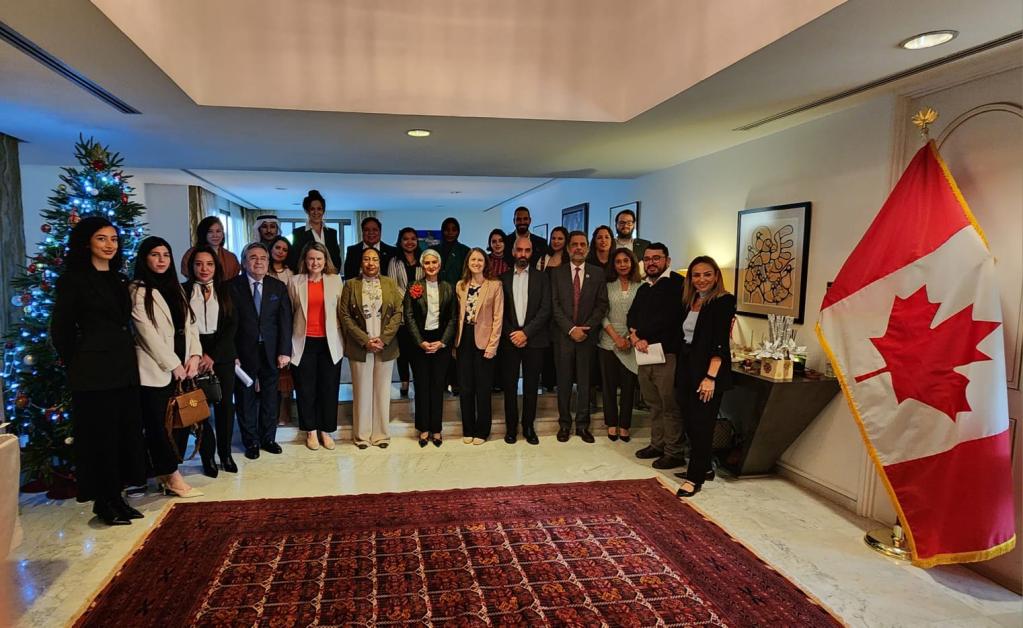
Story
10 December 2023
Young Ambassador Programme Season two - Climate Action:
Climate diplomacy is of paramount importance for young leaders in today’s world. As the inheritors of a planet facing unprecedented environmental challenges, the ability to engage in effective climate diplomacy is a crucial skillset to empower young people to bridge divides, build consensus, and hold decision-makers accountable, ensuring that the global community takes bold, urgent action to combat climate change. In the face of a rapidly changing climate, young leaders must recognize and be equipped for the pivotal role they play in shaping the world’s response to this existential challenge, making climate diplomacy an indispensable tool in their arsenal for a sustainable future. Climate diplomacy holds a direct link to the United Nations Sustainable Development Goal 13 (SDG 13), which focuses on Climate Action and Climate Justice. Young leaders engaging in climate diplomacy are effectively championing SDG 13’s mission to combat climate change and its impacts and promoting Agenda 2030 for Sustainable Development. By advocating for international agreements, promoting sustainable practices, and holding nations accountable for their commitments, they contribute to the global efforts required to limit global warming and protect our planet.
Objectives:
Diplomatic missions and UN agencies in Kuwait are seeking to champion the climate leaders of tomorrow through a programme that enables young students to gain first-hand experience of climate diplomacy. Participants will shadow diplomats and participate in diplomatic and learning initiatives that provide them with invaluable hands-on experience in climate diplomacy, communications, leadership and how to promote behavioral change which is so integral to climate action. The programme aims to empower the next generation to become confident advocates for climate action by engaging withseasoned diplomats and experts, gaining insights into the complexities of international negotiations, the importance of multilateral cooperation, and the art of building alliances. This exposure will not only nurture their understanding of diplomatic processes but also equip them with the skills and networks necessary to influence climate policies and foster collaboration between different stakeholders. In doing so, young leaders in Kuwait can contribute significantly to the realization of SDG 13: a sustainable, climate-resilient future for all, which leaves no one behind.
Programme Components:
The Embassies of Canada and the UK, and The United Nations Resident Coordinator’s Office invite interested Embassies to join the “Young Ambassador” initiative as a tangible contribution to highlight climate action and climate diplomacy in line with SDG 13. A collaboration with UN agencies, Embassies, and local partners, this programme will open doors for emerging leaders in Kuwait by providing a select group of high school students (female and male 15 to 18 years old) with mentoring and leadership development opportunities over a 5-month period (from November till 31st of March) through exposure to “real world” diplomacy, access to decisionmakers, and a platform to share their ideas and initiatives to promote climate action in Kuwait and beyond.
During this programme, each participant will:
Become a “Young Ambassador”
Participate in bi-monthly learning/ networking activities with all participants by an embassy, UN agency or partner organization on a particular climate theme (climate impacts, mitigation, adaptation, climate negotiations, loss and damage, climate finance etc..)
Develop leadership skills and gain support tools, confidence and a platform to enable both female and male Young Ambassadors to be effective and collaborative champions of climate action.
Programme Timeframe:
The initiative will be launched on social media and through a news release on October 24, 2023, to mark United Nations day. Applicants will have until November 13, 2023 to apply to the programme by submitting to info@randb-kw.com a short video response(not more than 1 min) to a question set by the organizers. Young Ambassadors will be selected on the basis of their submissions and criteria that ensures a diverse and inclusive group of participants.
The Young Ambassadors will then be matched with a participating embassy or international organization. Following a joint launch event at the UN House for all participants and partner embassies, each embassy can set its own agenda and plan to engage with the Young Ambassador. (For ease of reference and consistency, the organizers will share guidance with hosting entities to clarify expectations for engagement.), this will include six weekly mentoring sessions with host embassies/ organizations.
In addition, there will be one to two networking/learning activities per month for all participants to be hosted by the UN or partner organizations on key climate action themes. The organizers can provide a sample programme or ideas for activities to embassies who would find these helpful. We suggest where possible activities are linked to International days/ weeks.
Documentation through pictures and videos throughout the program is instrumental, in order to produce media material as we move along. Program and Timeframe: The program will end on March 31st, 2024
1 of 5
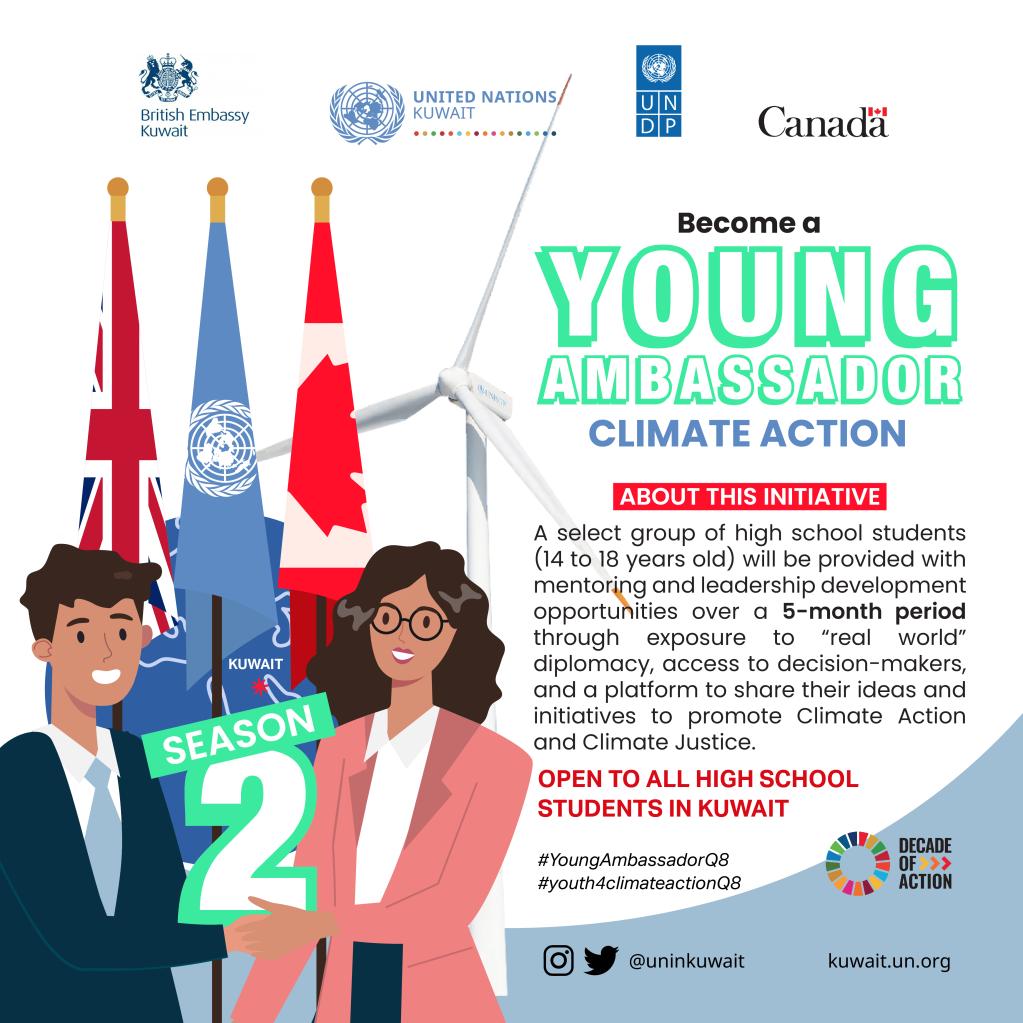
Press Release
28 October 2024
Young Ambassador Programme Season 3: Sustainable Peace and Security
Press Release
United Nations, UK and Canada Launch Season 3 of the Young Ambassador Programme: Sustainable Peace and SecurityOctober 28, 2024, UN House, Kuwait City – Under the auspices of the Ministry of Foreign Affairs, the United Nations Resident Coordinator Office in the State of Kuwait, in partnership with the British and Canadian Embassies, inaugurated the third season of the Young Ambassador Programme. The launch event was attended by the Kuwait Ministry of Foreign Affairs Representative, Minister Plenipotentiary Mohamed Rashid Al-Omairi, whose presence underscored the Ministry's commitment to youth engagement in promoting the United Nations Sustainable Development Goals (SDGs).Over its past two seasons, the Programme has provided a platform for secondary school students in Kuwait to develop the knowledge and skills needed to become impactful advocates for the United Nations Sustainable Development Goals (SDGs) and their role in promoting economic, social and environmental progress. Season One focused on gender equality, encouraging students to champion women’s inclusion and empowerment - while - in Season Two, participants honed their climate diplomacy skills. Both seasons were resoundingly successful, equipping students with the knowledge, skills and practical experience to advocate confidently on some of the most pressing global issues of today.Under the theme “Sustainable Peace and Security”, aligned with UN SDG 16, this year’s six-month Programme will equip 40 of Kuwait’s best and brightest young minds with core diplomatic and policy advocacy skills, with the goal of nurturing a new generation of leaders who will promoting positive, sustainable change in their local communities and beyond. Each Young Ambassador will be matched with a participating embassy or international organization, who will provide them with weekly mentoring sessions, while also benefiting from various group networking and learning activities throughout the Programme. Participants will learn to promote peaceful coexistence, mitigate conflicts, and foster secure, inclusive societies worldwide, contributing to the UN’s vision of a stable, peaceful, and just global community.In her address the Representative of the United Nations Secretary-General and Resident Coordinator in the State of Kuwait, Mrs. Ghada Eltahir, acknowledged the pivotal support of partner Embassies, particularly the British and Canadian Embassies, and the Ministry of Foreign Affairs. She noted their joint commitment has been instrumental in driving this initiative forward: “Your dedication is not only commendable but vital in advancing our shared vision of a peaceful and prosperous global community, as well as our common belief in placing youth at the heart of the Sustainable Development Goals (SDGs), especially SDG 16 on Peace, Justice, and Strong Institutions.” Deputy Assistant Minister of Foreign Affairs for International Organisations the Minister Plenipotentiary Mohamed Rashid Al-Omairi said: “We hope that this programme can empower the youth to be advocates for sustainable peace and security and further expose them to the principles of the UN Charter, which calls peaceful settlement of disputes and represent the guiding principles of international relations. The Youth in Kuwait have long played an important part in society. For as much we can teach and share our expertise in our fields, the youth of today can also help us learn, grow, and offer us a new perspective into pressing issues. By providing a platform for students to help their skills in the field, and exposing them to diplomacy, we are sure to gain from their contributions.”British Ambassador to the State of Kuwait, Mrs Belinda Lewis also expressed that: “The British Embassy is delighted to continue to support the Young Ambassador Programme, which is now in its third year. Through this Programme we have seen a number of highly motivated young people grow their confidence and leadership skills and we look forward to maintaining the same energy and passion this year as the group tackles the theme of Sustainable Peace and Security. This is a complex area, covering issues ranging from organized crime and open conflict, to transparent governance and representative decision-making. We look forward to our Young Ambassadors learning about these important topics and offering constructive challenges as they develop and share their insights, ideas and reflections.”H.E. Aliya Mawani, Canada’s Ambassador to the State of Kuwait, said: “Canada is proud to once again be collaborating with the Ministry of Foreign Affairs, United Nations, and diplomatic partners, to offer students in Kuwait this truly unique opportunity to learn about diplomacy first-hand from experts and practitioners, develop skills for effective advocacy, and contribute their insights on how to ensure a secure and peaceful world. We are living in complex times and the youth engagement is critical if our global governance and efforts to promote peace and security are to be relevant and fit for purpose. I’ve been so impressed by the previous Young Ambassadors and the passion and dedication that they brought to the programme and to sharing their experience with their communities. I look forward to getting to know this season’s cohort.”Reflecting on the global challenges facing today’s youth, from enduring conflicts to geopolitical tensions, Mrs. Eltahir emphasized the critical need for sustainable peace, especially in regions suffering from the devastating impacts of conflict. She also highlighted that the programme aligns with UN Secretary-General António Guterres’ vision for empowering young people to actively participate in decision-making processes, as part of the Pact for the Future.“As we witness the talents of these young ambassadors, I am confident they will continue to champion peace and inclusive societies in alignment with SDG 16,” Mrs. Eltahir concluded, congratulating the young ambassadors and partners alike.END.
United Nations, UK and Canada Launch Season 3 of the Young Ambassador Programme: Sustainable Peace and SecurityOctober 28, 2024, UN House, Kuwait City – Under the auspices of the Ministry of Foreign Affairs, the United Nations Resident Coordinator Office in the State of Kuwait, in partnership with the British and Canadian Embassies, inaugurated the third season of the Young Ambassador Programme. The launch event was attended by the Kuwait Ministry of Foreign Affairs Representative, Minister Plenipotentiary Mohamed Rashid Al-Omairi, whose presence underscored the Ministry's commitment to youth engagement in promoting the United Nations Sustainable Development Goals (SDGs).Over its past two seasons, the Programme has provided a platform for secondary school students in Kuwait to develop the knowledge and skills needed to become impactful advocates for the United Nations Sustainable Development Goals (SDGs) and their role in promoting economic, social and environmental progress. Season One focused on gender equality, encouraging students to champion women’s inclusion and empowerment - while - in Season Two, participants honed their climate diplomacy skills. Both seasons were resoundingly successful, equipping students with the knowledge, skills and practical experience to advocate confidently on some of the most pressing global issues of today.Under the theme “Sustainable Peace and Security”, aligned with UN SDG 16, this year’s six-month Programme will equip 40 of Kuwait’s best and brightest young minds with core diplomatic and policy advocacy skills, with the goal of nurturing a new generation of leaders who will promoting positive, sustainable change in their local communities and beyond. Each Young Ambassador will be matched with a participating embassy or international organization, who will provide them with weekly mentoring sessions, while also benefiting from various group networking and learning activities throughout the Programme. Participants will learn to promote peaceful coexistence, mitigate conflicts, and foster secure, inclusive societies worldwide, contributing to the UN’s vision of a stable, peaceful, and just global community.In her address the Representative of the United Nations Secretary-General and Resident Coordinator in the State of Kuwait, Mrs. Ghada Eltahir, acknowledged the pivotal support of partner Embassies, particularly the British and Canadian Embassies, and the Ministry of Foreign Affairs. She noted their joint commitment has been instrumental in driving this initiative forward: “Your dedication is not only commendable but vital in advancing our shared vision of a peaceful and prosperous global community, as well as our common belief in placing youth at the heart of the Sustainable Development Goals (SDGs), especially SDG 16 on Peace, Justice, and Strong Institutions.” Deputy Assistant Minister of Foreign Affairs for International Organisations the Minister Plenipotentiary Mohamed Rashid Al-Omairi said: “We hope that this programme can empower the youth to be advocates for sustainable peace and security and further expose them to the principles of the UN Charter, which calls peaceful settlement of disputes and represent the guiding principles of international relations. The Youth in Kuwait have long played an important part in society. For as much we can teach and share our expertise in our fields, the youth of today can also help us learn, grow, and offer us a new perspective into pressing issues. By providing a platform for students to help their skills in the field, and exposing them to diplomacy, we are sure to gain from their contributions.”British Ambassador to the State of Kuwait, Mrs Belinda Lewis also expressed that: “The British Embassy is delighted to continue to support the Young Ambassador Programme, which is now in its third year. Through this Programme we have seen a number of highly motivated young people grow their confidence and leadership skills and we look forward to maintaining the same energy and passion this year as the group tackles the theme of Sustainable Peace and Security. This is a complex area, covering issues ranging from organized crime and open conflict, to transparent governance and representative decision-making. We look forward to our Young Ambassadors learning about these important topics and offering constructive challenges as they develop and share their insights, ideas and reflections.”H.E. Aliya Mawani, Canada’s Ambassador to the State of Kuwait, said: “Canada is proud to once again be collaborating with the Ministry of Foreign Affairs, United Nations, and diplomatic partners, to offer students in Kuwait this truly unique opportunity to learn about diplomacy first-hand from experts and practitioners, develop skills for effective advocacy, and contribute their insights on how to ensure a secure and peaceful world. We are living in complex times and the youth engagement is critical if our global governance and efforts to promote peace and security are to be relevant and fit for purpose. I’ve been so impressed by the previous Young Ambassadors and the passion and dedication that they brought to the programme and to sharing their experience with their communities. I look forward to getting to know this season’s cohort.”Reflecting on the global challenges facing today’s youth, from enduring conflicts to geopolitical tensions, Mrs. Eltahir emphasized the critical need for sustainable peace, especially in regions suffering from the devastating impacts of conflict. She also highlighted that the programme aligns with UN Secretary-General António Guterres’ vision for empowering young people to actively participate in decision-making processes, as part of the Pact for the Future.“As we witness the talents of these young ambassadors, I am confident they will continue to champion peace and inclusive societies in alignment with SDG 16,” Mrs. Eltahir concluded, congratulating the young ambassadors and partners alike.END.
1 of 5
Press Release
22 September 2024
Local conference for Youth Ahead of COP29
Remarks by Mrs. Ghada EltahirRepresentative of UN Secretary-General and Resident Coordinator to the State of Kuwait22 September 20246 - 8pm Dear dedicated members of AlManakh…Representative of the Public Authority for Youth Affairs…Our Young Artists…Valued members of AIESEC…and all the inspiring young people here today, It is truly an honor to join you in celebrating the outstanding work of AlManakh, Kuwait’s pioneering youth organization, leading the way in raising awareness about climate change and sustainability. Today’s Local Conference of Youth (LCOY) is not just a milestone but a powerful sign of progress and a reflection of your vision, determination, and the strength of youth-led initiatives. On behalf of the United Nations, I offer my heartfelt congratulations to AlManakh and everyone present for bringing this vital discussion to Kuwait and for being recognized by YOUNGO under the United Nations Framework Convention on Climate Change (UNFCCC).We often hear that youth are the leaders of tomorrow, but as we see here today, you are also the leaders of today. Your passion, creativity, and eagerness to learn from each other make you the driving force of the climate movement in Kuwait and beyond. In gatherings like this, where you share ideas and work together, you are making a difference that will reach far beyond this room. Your creative ideas, ambitious energy, and determined willingness to challenge the status quo remind us that the fight against climate change is not just about policies—it’s about building a forward-thinking community and therefore fostering a simultaneously optimistic and strategic mindset that drives meaningful, long-term change. To many, sustainable systems and cultures may seem like distant dreams or mere possibilities. However, it is thanks to dedicated young people like you who actively seek to make these visions a reality. I am thrilled to witness how today’s event, and the initiatives we see involving work in the community, is a testament to this shift.By fostering dialogue and partnerships among youth, whether through research, engaging panels, or international collaboration, you are sparking hope and inspiring action. As the only NGO in Kuwait recognized by YOUNGO, AlManakh is showing what’s possible when young people come together to take meaningful action. Your message, your outreach to the community, and the partnerships you’ve built show us that when we unite, we are stronger, and together we can achieve the SDGs.Today’s discussion is another very crucial stepping stone in the continued dialogue that empowers the changemakers to drive the conversation forward and hold the world accountable. As the 29th Conference of the Parties to UNFCCC approaches, I encourage everyone to use today’s event as a foundation to dive into deeper discussions, engage more fully in the global dialogue, and harness the collective power that arises from bringing your ideas together to positively influence the outcomes of COP 29. You are not merely inheriting this planet; you are actively reshaping it with every discussion, idea, piece of art, and act of advocacy. Your determination to push for change, speak truth to power, and advocate for the future we all deserve is what makes events like this so impactful.Thank you again, AlManakh, this recognition speaks volumes about your dedication, hard work, and the positive impact you have on youth and climate action. Your leadership in this important initiative is inspiring, and we are confident that your efforts will continue to pave the way for meaningful progress, in Kuwait and beyond. Keep up the incredible work!And to all the young leaders and artists in this room, thank you, let today remind us all of what’s possible when youth lead the way, driving us forward toward a more resilient, sustainable, and vibrant world.The United Nations is here to support, amplify, and celebrate your efforts. Your voices matter, and your actions inspire us all to lead by example.www.almanakhkw.org
1 of 5
Press Release
07 September 2024
Duchenne Muscular Dystrophy (DMD) Awarness Day
The United Nations in Kuwait observed World Duchenne Awareness Day on September 7, 2024, raising awareness about Duchenne Muscular Dystrophy (DMD) and advocating for greater global and local efforts to address this devastating condition.Duchenne Muscular Dystrophy is one of the most severe forms of muscular dystrophy, primarily affecting boys. It is caused by mutations in the DMD gene, which plays a critical role in producing dystrophin, a protein essential for muscle function. The absence of dystrophin leads to progressive muscle weakness, loss of motor function, respiratory difficulties, and ultimately heart complications.Globally, DMD affects approximately 1 in every 3,500 to 5,000 live male births. In Kuwait, the prevalence of genetic disorders, including DMD, is a significant concern. A study conducted in Kuwait identified 68 families affected by the DMD mutation, underscoring the pressing need for early detection, effective healthcare interventions, and ongoing research to support those living with the condition.Kuwait's pivotal role in establishing World Duchenne Awareness Day is a testament to its leadership and commitment to raising global awareness about DMD. Through this annual observance, Kuwait aims to foster a deeper understanding of the disorder, promote early diagnosis, and encourage advancements in treatment and care. Our dedication extends beyond national borders, as we join the global community in striving to improve the lives of individuals living with DMD and other rare genetic diseases that, although less common, have profound impacts on quality of life and impose significant healthcare costs.Dr. Assad Hafeez, WHO Representative to the State of Kuwait, emphasized the importance of this awareness campaign, saying: "World Duchenne Awareness Day is a critical opportunity to amplify the voices of those affected by DMD. The WHO is committed to working with Kuwait and other member states to improve healthcare access, early diagnosis, and treatment advancements, ensuring that all affected individuals receive the support they need."The theme for this year’s World Duchenne Awareness Day, “Raise Your Voice for Duchenne,” emphasizes the importance of amplifying the voices of those affected by DMD and other dystrophinopathies. It calls for action to advocate for their rights, inclusion, and overall well-being, ensuring they receive the support and care they deserve.The WHO continues to work collaboratively with Member States to enhance awareness, provide best practice guidelines, and integrate the needs of the most vulnerable into health and non-health policies alike. Through collective action and sustained commitment, we can make a meaningful difference in the lives of those affected by DMD.-ENDS-About WHODedicated to the well-being of all people and guided by science, the World Health Organization leads and champions global efforts to give everyone, everywhere and equal chance at a safe and healthy life. We are the United Nations agency for health that connects nations, partners and people on the front lines in 150+ locations, leading the world’s response to health emergencies, preventing disease, addressing the root causes of health issues, and expanding access to medicines and health care. Our mission is to promote health, keep the world safe and serve the vulnerable.
1 of 5
Press Release
08 March 2024
Kuwait Marks International Women's Day
As we commemorate International Women's Day, I am honored to highlight the profound contributions of women in Kuwait and around the world. Today, we celebrate not only their achievements but also acknowledge the formidable challenges many women face daily.In the State of Kuwait, women have played a vital role in the country's progress, contributing significantly to various sectors. However, we recognize that gender disparities persist, and concerted efforts are required to ensure equal opportunities for women in all aspects of life. The United Nations remains committed to supporting initiatives that promotes women empowerment in leadership, socially, economically, and eliminate barriers that hinder their full potential.This year's theme, 'Break the Bias,' resonates strongly as we address deeply ingrained stereotypes and prejudices. It is imperative to implement relevant laws and legislations and fostering an environment that values diversity and inclusivity, to pave the way for a more just and equitable society.Empowering women is not just a moral imperative but a strategic investment in the sustainable development of our communities. As stated in Kuwait vision 2035 pillar 6 on human capital. I command the leadership and our partners in the state of Kuwait, on the efforts done so far, and I call on governments counterparts, civil society, and the private sector to join hands in advancing woman empowerment commitments.As we mark Women's Day, it is crucial to extend our heartfelt solidarity to the resilient women of Palestine, who face unique challenges amid complex geopolitical circumstances. The UN Resident Coordinator, Ms. Ghada Eltaher, emphasizes our commitment to supporting Palestinian women in their pursuit of rights, dignity, and empowerment. Recognizing the extraordinary strength displayed by Palestinian women, we stand united in advocating for their inclusion, security, and the realization of their aspirations for a just and prosperous future. The UN reiterates its dedication to working with the international community to address the specific needs of Palestinian women, and women in conflicts around the world Im fostering a world where every woman, regardless of her background, can thrive and contribute to positive societal transformations.I also to take this opportunity to reiterate on UNDSG recent visit, to express my deep appreciation for the collaborative spirit demonstrated at the recent business dinner held hosted by HE Ambassador Sheikha Jawaher Al-Sabah, Assistant Foreign Minister for Human Rights Affairs Kuwait, in honor of HE Deputy Secretary-General Amina Mohammad, in presence of distinguished women in leadership and economy from various fields.The event served as a platform for constructive dialogue, networking, and knowledge exchange, aligning with the UN's commitment to fostering partnerships for global progress on women empowerment and SDG5. The discussion showcased diverse perspectives on gender equality, sustainable development, the regional geopolitical situation and its impact on the region and beyond. The main outcomes of the interaction focused on fostering a foundation for future collaborations, where potential areas for collaboration and future partnerships were identified, emphasizing the shared commitment to advancing common goals in diplomacy, leadership, peace and security, economy and communication.Ms. Eltaher commends the commitment of all these inspiring women towards building a more inclusive and sustainable future for Kuwait and beyond. The event exemplified the power of collaboration, recognizing the critical role of women in leadership in shaping a positive impact at both local and global levels.The DSG/UN looks forward to continued engagement and advisory role respectively with these esteemed women in advancing the UN's mission and contributing to the achievement of the Kuwait Vision 2035 and Sustainable Development, the six transitions, particularly in relation to SDG5 and SDG16.
1 of 5
Press Release
29 January 2024
Workshop on the Development of National Human Rights Plans to Follow Up the Implementation of Recommendations Issued by International Human Rights Mechanisms
H.E. Sheikha Jawaher Al-Sabah, Assistant Foreign Minister for Human Rights of the State of Kuwait
Mr. Mazen Shaqoura, Regional Representative of the Office of the United Nations High Commissioner for the Middle East and North Africa
Your Excellencies Ambassadors
Colleagues, friends, ladies and gentlemen, distinguished guests, good morning,
I am honored to stand before you today to address this esteemed assembly on our collaborative efforts and commitments to human rights in the State of Kuwait. I would like to start by congratulating the State of Kuwait's for its recent membership at the United Nations Human Rights Council (UNHRC) which further exemplifies its commitment to promoting and safeguarding human rights on the global stage. Kuwait's active participation in the council provides a platform to contribute its unique perspectives, experiences, and initiatives to the international human rights discourse. This involvement signifies a willingness to not only uphold its own human rights standards but also to contribute constructively to the advancement of global norms and practices. The United Nations’s partnership with the State of Kuwait reflects a shared dedication to upholding the principles enshrined in the Universal Declaration of Human Rights. Over the years, we have witnessed Kuwait’s unwavering commitment to fostering an environment where every individual's dignity and rights are respected. Kuwait's engagement with UN mechanisms at various levels and mandated institutions, with the Esteemed Ministry of Foreign Affairs on the forefront has been instrumental in promoting human rights. Through dialogue and cooperation, we have collectively worked towards advancing social justice, promoting gender equality, and ensuring the protection of vulnerable populations. The Government of Kuwait's initiatives, such as its national action plans and legislative reforms, underscore its determination to create a society where human rights are a cornerstone. It is imperative to acknowledge Kuwait's strides in aligning its domestic policies with international human rights standards. Our collaborative efforts extend beyond rhetoric, manifesting tangible improvements in areas such as education, healthcare, People with Disabilities, Women’s rights and labor rights. This reflects not only a commitment to human rights but also a dedication to sustainable development. Kuwait has demonstrated a commendable dedication to improving its human rights record by actively engaging with OHCHR recommendations and following up on Special Procedures towards implementing international mechanisms of human rights. The ongoing dialogue between Kuwait and the UN reflects a commitment to continuous self-assessment and improvement and a willingness to address challenges, implement reforms, and align policies with international human rights standards. A significant milestone in Kuwait's commitment to human rights is the establishment of the National Diwan of Human Rights. This institution serves as a pivotal platform for fostering dialogue, engagement, and collaboration among various stakeholders, including government officials, civil society organizations, and the public. The National Diwaniya stands as a testament to Kuwait's dedication to transparency and accountability, reinforcing the commitment to creating a society where human rights are not only upheld but actively promoted at every level. The United Nations has always and continues to stand ready to provide all necessary support. As we move forward, let us reaffirm our joint commitment to strengthening the partnership between Kuwait and the United Nations. By leveraging our collective expertise and resources, we can further enhance mechanisms for the protection and promotion of human rights. This includes strengthening institutions (capacity building), empowering civil society, and fostering inclusive dialogues that amplify the voices of those often marginalized. Last but not least, I express my sincere gratitude to the Ministry of Foreign Affairs represented by Sheikha Jawaher, Assistant Foreign Minister for Human Rights Affairs, for Kuwait's continuous collaboration and reiterate the UN's steadfast commitment to supporting the nation's efforts in advancing human rights, where the principles of equality, justice, and dignity are not just aspirations but the lived reality for everyone in Kuwait and beyond. Thank you , Shukran Jazeelan
Mr. Mazen Shaqoura, Regional Representative of the Office of the United Nations High Commissioner for the Middle East and North Africa
Your Excellencies Ambassadors
Colleagues, friends, ladies and gentlemen, distinguished guests, good morning,
I am honored to stand before you today to address this esteemed assembly on our collaborative efforts and commitments to human rights in the State of Kuwait. I would like to start by congratulating the State of Kuwait's for its recent membership at the United Nations Human Rights Council (UNHRC) which further exemplifies its commitment to promoting and safeguarding human rights on the global stage. Kuwait's active participation in the council provides a platform to contribute its unique perspectives, experiences, and initiatives to the international human rights discourse. This involvement signifies a willingness to not only uphold its own human rights standards but also to contribute constructively to the advancement of global norms and practices. The United Nations’s partnership with the State of Kuwait reflects a shared dedication to upholding the principles enshrined in the Universal Declaration of Human Rights. Over the years, we have witnessed Kuwait’s unwavering commitment to fostering an environment where every individual's dignity and rights are respected. Kuwait's engagement with UN mechanisms at various levels and mandated institutions, with the Esteemed Ministry of Foreign Affairs on the forefront has been instrumental in promoting human rights. Through dialogue and cooperation, we have collectively worked towards advancing social justice, promoting gender equality, and ensuring the protection of vulnerable populations. The Government of Kuwait's initiatives, such as its national action plans and legislative reforms, underscore its determination to create a society where human rights are a cornerstone. It is imperative to acknowledge Kuwait's strides in aligning its domestic policies with international human rights standards. Our collaborative efforts extend beyond rhetoric, manifesting tangible improvements in areas such as education, healthcare, People with Disabilities, Women’s rights and labor rights. This reflects not only a commitment to human rights but also a dedication to sustainable development. Kuwait has demonstrated a commendable dedication to improving its human rights record by actively engaging with OHCHR recommendations and following up on Special Procedures towards implementing international mechanisms of human rights. The ongoing dialogue between Kuwait and the UN reflects a commitment to continuous self-assessment and improvement and a willingness to address challenges, implement reforms, and align policies with international human rights standards. A significant milestone in Kuwait's commitment to human rights is the establishment of the National Diwan of Human Rights. This institution serves as a pivotal platform for fostering dialogue, engagement, and collaboration among various stakeholders, including government officials, civil society organizations, and the public. The National Diwaniya stands as a testament to Kuwait's dedication to transparency and accountability, reinforcing the commitment to creating a society where human rights are not only upheld but actively promoted at every level. The United Nations has always and continues to stand ready to provide all necessary support. As we move forward, let us reaffirm our joint commitment to strengthening the partnership between Kuwait and the United Nations. By leveraging our collective expertise and resources, we can further enhance mechanisms for the protection and promotion of human rights. This includes strengthening institutions (capacity building), empowering civil society, and fostering inclusive dialogues that amplify the voices of those often marginalized. Last but not least, I express my sincere gratitude to the Ministry of Foreign Affairs represented by Sheikha Jawaher, Assistant Foreign Minister for Human Rights Affairs, for Kuwait's continuous collaboration and reiterate the UN's steadfast commitment to supporting the nation's efforts in advancing human rights, where the principles of equality, justice, and dignity are not just aspirations but the lived reality for everyone in Kuwait and beyond. Thank you , Shukran Jazeelan
1 of 5
Latest Resources
1 / 11
Resources
05 December 2024
Resources
16 January 2024
1 / 11


